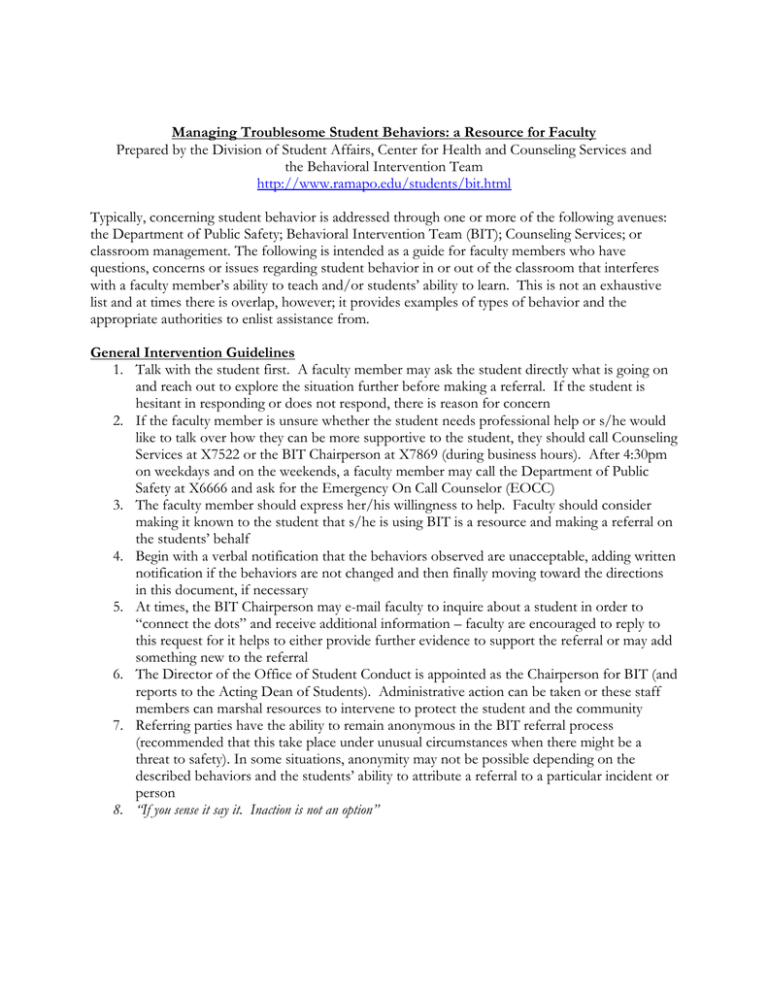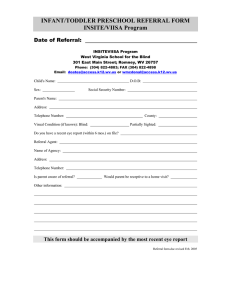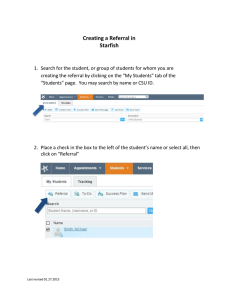Managing Troublesome Student Behaviors: a Resource for Faculty
advertisement

Managing Troublesome Student Behaviors: a Resource for Faculty Prepared by the Division of Student Affairs, Center for Health and Counseling Services and the Behavioral Intervention Team http://www.ramapo.edu/students/bit.html Typically, concerning student behavior is addressed through one or more of the following avenues: the Department of Public Safety; Behavioral Intervention Team (BIT); Counseling Services; or classroom management. The following is intended as a guide for faculty members who have questions, concerns or issues regarding student behavior in or out of the classroom that interferes with a faculty member’s ability to teach and/or students’ ability to learn. This is not an exhaustive list and at times there is overlap, however; it provides examples of types of behavior and the appropriate authorities to enlist assistance from. General Intervention Guidelines 1. Talk with the student first. A faculty member may ask the student directly what is going on and reach out to explore the situation further before making a referral. If the student is hesitant in responding or does not respond, there is reason for concern 2. If the faculty member is unsure whether the student needs professional help or s/he would like to talk over how they can be more supportive to the student, they should call Counseling Services at X7522 or the BIT Chairperson at X7869 (during business hours). After 4:30pm on weekdays and on the weekends, a faculty member may call the Department of Public Safety at X6666 and ask for the Emergency On Call Counselor (EOCC) 3. The faculty member should express her/his willingness to help. Faculty should consider making it known to the student that s/he is using BIT is a resource and making a referral on the students’ behalf 4. Begin with a verbal notification that the behaviors observed are unacceptable, adding written notification if the behaviors are not changed and then finally moving toward the directions in this document, if necessary 5. At times, the BIT Chairperson may e-mail faculty to inquire about a student in order to “connect the dots” and receive additional information – faculty are encouraged to reply to this request for it helps to either provide further evidence to support the referral or may add something new to the referral 6. The Director of the Office of Student Conduct is appointed as the Chairperson for BIT (and reports to the Acting Dean of Students). Administrative action can be taken or these staff members can marshal resources to intervene to protect the student and the community 7. Referring parties have the ability to remain anonymous in the BIT referral process (recommended that this take place under unusual circumstances when there might be a threat to safety). In some situations, anonymity may not be possible depending on the described behaviors and the students’ ability to attribute a referral to a particular incident or person 8. “If you sense it say it. Inaction is not an option” Other Campus Resources 1. Complaints pertaining to discrimination and workplace compliance (this includes sexual harassment) and complaints against College employees are managed by the Director of Affirmative Action and Workplace Compliance: Melissa Van Der Wall, Mansion room 201, at X7540 2. Roommate conflicts are managed through the Hall Office where the student resides on campus Revised July 2015

